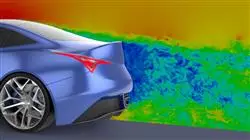University certificate
The world's largest faculty of information technology”
Description
Enroll now and become an expert in Fluid Modeling 6 months"

Turbulence cannot be calculated but modeled, that is one of the fundamental aspects of its study, which makes research in this field very complex and expensive, requiring the use of the largest computers, for a long time, for results that are not very useful. These resources are unattainable for most users or companies and that is why Fluid Modeling is so relevant, because it is very efficient and has multiple advantages that save these problems.
For this reason, there is a growing demand for specialists in this sector, which is why TECH Global University has decided to create a University Expert in Fluid Modeling with which it seeks to provide students with new skills and better competencies, with which they can face a successful professional future in this area. Throughout the syllabus, topics such as the Energy Cascade, Wall Turbulence, Euler's Equations or Convection Heat Transfers, among others, are deeply approached.
All this, through a convenient 100% online modality that gives the student total freedom to combine their studies with other professional and personal work, without the need to travel. In addition, with the most complete multimedia content, the most updated information and the most innovative teaching tools.
Gain new skills in Fluid Modeling and excel in one of the most promising sectors in the IT field"
This postgraduate diploma in Fluid Modeling contains the most complete and up-to-date program on the market. The most important features include:
- The development of practical cases presented by experts in Fluids modeling
- The graphic, schematic, and practical contents with which they are created, provide scientific and practical information on the disciplines that are essential for professional practice
- Practical exercises where self-assessment can be used to improve learning
- Its special emphasis on innovative methodologies
- Theoretical lessons, questions to the expert, debate forums on controversial topics, and individual reflection assignments
- Content that is accessible from any fixed or portable device with an Internet connection
Access all the content in Advanced CFD Models, without time limits and from any device with internet connection"
The program’s teaching staff includes professionals from the sector who contribute their work experience to this educational program, as well as renowned specialists from leading societies and prestigious universities.
Its multimedia content, developed with the latest educational technology, will provide the professional with situated and contextual learning, i.e., a simulated environment that will provide an immersive education programmed to learn in real situations.
The design of this program focuses on Problem-Based Learning, by means of which the professional must try to solve the different professional practice situations that are presented throughout the academic course. For this purpose, the student will be assisted by an innovative interactive video system created by renowned experts.
Deepen your knowledge in water foil, thanks to the most complete theoretical and practical material"

Acquire new skills in Convection Heat Transfer or Bidirectional Cosimulation"
Objectives
The objective of this University Expert in Fluid Modeling is to provide new knowledge and equip students with better skills so that they can face a successful professional future in this area, with full capacity to overcome any work or inconvenience that may arise. All this, through the most updated and practical contents of the academic market.

Get a position in one of the most promising areas of engineering, thanks to TECH Global University"
General Objectives
- Establish the basis for the study of turbulence
- Develop CFD statistical concepts
- Determine the main computational techniques in turbulence research
- Generate specialized knowledge in the method of Finite Volumes
- Acquire specialized knowledge in fluid mechanics calculation techniques
- Examine the wall units and the different regions of a turbulent wall flow
- Determine the characteristics of compressible flows
- Examine multiple models and multiphase methods
- Develop expertise on multiple models and methods in multiphysics and thermal analysis
- Interpret the results obtained by correct post-processing
Specific Objectives
Module 1. Modeling of turbulence in Fluid
- Applying the concept of orders of magnitude
- To present the problem of closure of the Navier-Stokes equations
- Examining energy budget equations
- Developing the concept of turbulent viscosity
- To substantiate the different types of RANS and LES
- To present the regions of a turbulent flow
- Modeling the energy equation
Module 2. Compressible Fluids
- To develop the main differences between compressible and incompressible flow
- Examine typical examples of the occurrence of compressible fluids
- Identify the peculiarities in the solution of hyperbolic differential equations
- Establish the basic methodology for solving the Riemann problem
- Compile different resolution strategies
- Analyze the pros and cons of the different methods
- To present the applicability of these methodologies to the Euler / Navier-Stokes equations, showing classical examples
Module 3. Multiphase flow
- Distinguish what type of multiphase flow is to be simulated: continuous phases, such as simulating a ship at sea, a continuous medium; discrete phases, such as simulating specific droplet trajectories; or use statistical populations when the number of particles, droplets or bubbles is too large to be simulated
- Establish the difference between Lagrangian, Eulerian and mixed methods
- Determine the tools best suited to the type of flow to be simulated
- Modeling the effects of surface tension and phase changes such as evaporation, condensation or capitation
- Develop boundary conditions for wave simulation, learn about the different wave models and apply the so-called numerical beach, a region of the domain located at the exit whose objective is to avoid wave reflection
Module 4. Advanced CFD Models
- Distinguish what type of physical interactions are to be simulated: fluid-structure, such as a wing subject to aerodynamic forces, fluid coupled with rigid body dynamics, such as simulating the motion of a buoy floating in the sea, or thermofluid, such as simulating the distribution of temperatures in a solid subject to air currents
- Distinguish the most common data exchange schemes between different simulation software and when one or the other can or is best to be applied
- Examine the various heat transfer models and how they can affect a fluid
- Model convection, radiation and diffusion phenomena from a fluid point of view, model sound creation by a fluid, model simulations with advection-diffusion terms to simulate continuous or particulate media and model reactive flows

Make the most of this opportunity to learn about the latest advances in this field in order to apply it to your daily practice"
Postgraduate Certificate in Fluid Modeling
Fluid modeling is a key technique in various areas of industry and engineering, allowing the simulation and analysis of complex processes and phenomena, as well as the optimization of equipment and production processes. At TECH Global University we have designed a Postgraduate Certificate in Fluid Modeling program that provides highly specialized training in the use of simulation and fluid modeling software, as well as in the analysis and design of processes for various industrial applications.
In this program, students will learn how to use fluid simulation and modeling software in the analysis and design of processes for various industrial applications.
In this program, students will learn how to use fluid modeling software in the analysis and design of processes for various industrial applications.
In this program, you will delve into the use of tools such as ANSYS Fluent, COMSOL Multiphysics and OpenFOAM, as well as the modeling of heat transfer, turbulence and mass transport processes. In addition, topics such as multiphase flow simulation and optimization of equipment and production processes will be addressed. Our focus is on providing students with a solid theoretical and practical foundation that will allow them to apply their knowledge in real industry situations. As part of the program, practical projects will be carried out to apply the acquired knowledge and develop skills in the solution of complex problems. With our Postgraduate Certificate in Fluid Modeling program, students will be prepared to face the challenges of industry and contribute to the advancement of engineering in this critical field.







